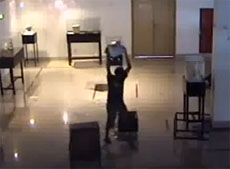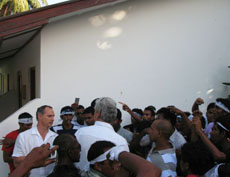Vilu Reef resort has allegedly terminated 18 members of staff, with some given just one hour to leave, after employees had presented management with a list of grievances.
Speaking with Minivan News, Ahmed Rasheed – a Vilu Reef employee for two years before his dismissal yesterday – described his termination:
“They sent me with 5 police guards into my room. They locked the door and asked me to pack within one hour.”
Vilu Reef is part of the Sun Travel & Tours group – a company owned by the prominent businessman and Maldives Development Alliance (MDA) leader Ahmed ‘Sun’ Shiyam.
After compiling a list of grievances against the resort, Rasheed explained that he had prepared a petition on which he managed to get 153 signatures from fellow staff.
He recalled that the demands were then presented to the hotel management on March 17, who came back to the employees, suggesting “if you don’t want to stay here you can leave.”
After conferring with the staff team, employees then decided to strike, stated Rasheed, with around 50 resort employees congregating at around 11pm with their demands on Sunday (March 23).
The management called police, but assured staff that no would be terminated, said Rasheed. They agreed to carry out amendments to meet the requests as of the April 30, he added, “so the next day we went back to work.”
“I was fired after two days,” continued Rasheed. “They just give me a call and said ‘hey can you come to the office’, then they gave me a letter. They asked me to sign.”
According to Rasheed’s termination contract, the reason Vilu Reef fired him was because his post was no longer available.
The termination letter stated that the employees were being fired due to their posts “being made redundant” and were asked to leave with “immediate effective (sic) of March 25”.
The letter acknowledges that there should be one month’s notice for the termination of staff, and therefore the management “have decided to as an extra measure compensation payment in lieu of three months notice period.”
The next steps, according to Rasheed, are being supported by the Tourism Association of Maldives (TEAM).
“We are not a member of TEAM but we are really thanking them for their help. They are helping us to do something good. At least we have some people who are trying to get our rights back.”
Workers’ right to strike
TEAM Secretary General Mauroof Zakir told Minivan News that TEAM would assist the staff in taking the case to the Employment Tribunal, though felt there would be “no hope” for a fair case.
“Shiyam is very strong here,” he noted, “one of the partners of the government.”
“Since 2012 the decisions are against international standards and international best practice,” he added. “It’s all corrupt judiciary, and high court decisions against employment cases are one of the key factors.”
According to the Freedom of Peaceful Assembly Act 2013, tourist resorts, ports, and airports fall into a category of places in which protests are prohibited.
The US State Department expressed concern about the change in this law in their recently released 2013 Human Rights Report.
Local NGOs Transparency Maldives and the Maldivian Democracy Network have also expressed their concern that the law has impacted upon freedom of peaceful assembly.
No-one from the management team at Vilu Reef was available for comment when contacted by Minivan News.
Earlier this year the prestigious One & Only Reethi Rah resort saw an estimated 90% of its employees partake in an organised strike against perceived ill treatment and discrimination.
The strike was called following the management’s failure to meet employees to discuss concerns regarding discrimination against local workers, and a team of police were dispatched to the resort.
In a similar case in September 2013, staff at Irufushi Beach and Spa resort reported a “firing spree” affecting staff members professing to support the Maldivian Democratic Party.
The resort, which in May 2013 abruptly terminated its agreement with hotel giant Hilton – leading to the overnight resignation of 30 employees – is also part of the Sun Travel group.
A source working at the hotel at the time of publishing stated, “Shiyam took over this resort in what the staff refers to as another coup d’etat at the resort level. Since then we have been gradually stripped of rights we are legally entitled to as citizens of the Maldives.”
 “I’m very surprised the government [is holding this event] but are not able to arrest those who
“I’m very surprised the government [is holding this event] but are not able to arrest those who 